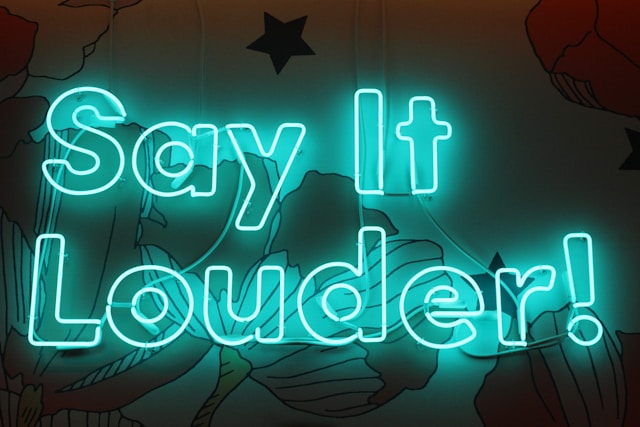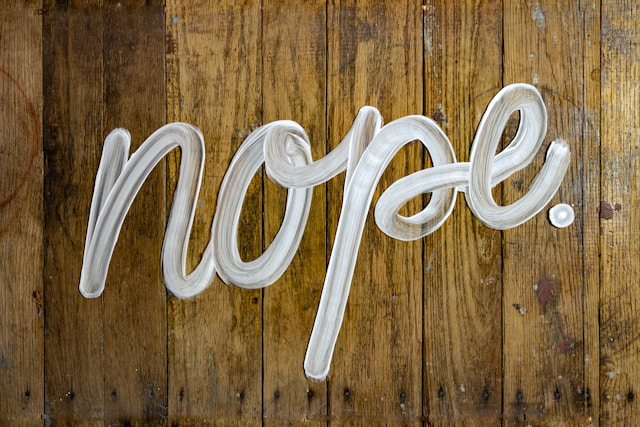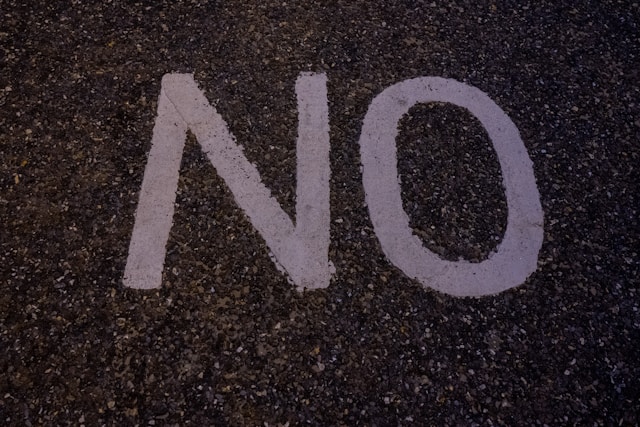Physical Address
304 North Cardinal St.
Dorchester Center, MA 02124
Physical Address
304 North Cardinal St.
Dorchester Center, MA 02124

Have you ever said “yes” when every bone in your body wanted to scream “no”?
Yeah… we’ve all passed through this experience.
Here’s the hidden pattern behind it all: society has brainwashed you into believing that saying yes makes you a good person, a kind soul, a dependable friend.
But what happens if you discover that… constantly saying “yes” is slowly draining your energy, damaging your mental health, and making you less productive than you could ever imagine?
Today, we’re focusing on why it’s not only okay to say no, but it’s actually healthier than being nice.
I want you to come closer because by the end of this article, you’ll never look at the word “no” the same way again.
Yes, we all know that
Saying “no” is hard. It feels like rejection, as though you’re letting someone down, and it makes you come off as selfish.
But here’s the raw truth: every time you say yes to something you don’t want, you’re saying no to yourself.
It’s as simple as that.
If I may ask, how many times have you agreed to stay late at work, help someone move, or take on extra tasks—only to feel resentful, exhausted, and completely drained afterward?
We’ve been taught that “being nice” is a virtue. And sure, kindness is powerful, no doubt about that. But being “nice” at the expense of your own mental and physical health is not noble. That’s self-destruction dressed up as virtue.
So… why is saying no healthier than being nice?
Let’s break it down by starting with.
Let’s kick off with this scenario. It’s Friday afternoon, your inbox is overflowing, and your couch is calling. Then your phone buzzes with a friend who needs a favor, or a colleague who wants you to take on an extra project. On his part, your boss asks if you’re free this weekend.
With all these barrages of calls, your gut screams “no.” But your mouth, as usual, says “yes.”
Does this sound much like you on a typical day?

If you answered yes, you’re not alone in struggling with this. What you’re about to uncover could save you years of struggling with stress, anxiety, and other mental health challenges.
Research shows that over 40% of adults report chronic difficulty saying no, leading to burnout, resentment, and exhaustion. We live in an age of endless expectations, from work, friends, family, and ourselves. Everyone wants a piece of your time, your energy, your attention.
But what if the real problem isn’t that you’re selfish for wanting to say no? What if it’s actually the opposite? What if learning to say no is one of the most generous, powerful, and necessary things you can do for your mental health and the quality of your relationships?
In this post, you’ll discover the science-backed reasons why saying no is not only okay—it’s essential. You’ll learn practical strategies to overcome guilt, handle pushback, and finally reclaim your time and energy. By the end, you’ll understand that the power of saying no isn’t about being difficult. It’s essentially about being honest.
Let’s get straight to the point: the art of saying no is a skill most of us were never taught.
Growing up, many of us were conditioned to be helpful, polite, and accommodating. We learned that saying yes meant we were good people, while saying no meant we were selfish, rude, or uncommitted.
But here’s where the story takes an unexpected turn.
The more you say yes to things you don’t want to do, the less authentic you become. You’re not being kind—you’re being dishonest. You’re making promises you don’t want to keep, and agreeing to spend time you don’t have on activities that drain you.
And here’s what most people don’t realize about why it’s okay to say no: When you say yes to everything, you’re actually teaching people to disrespect your boundaries.
Yeah, that’s the truth. I know it’s partly not your fault because society had already prepared you for the life of being a glorified people-pleaser.
The pains that come with always saying yes to people can cause monumental damage to your mental and emotional well-being. You’re not failing at learning to say no because you’re weak; you’re basically failing yourself because you’re misinformed.
Research from Stanford University on burnout and compassion fatigue shows that people who consistently struggle to set boundaries experience significantly higher levels of stress, anxiety, and depression. They’re more likely to experience physical health problems and have lower life satisfaction overall.
The undeniable fact is this: You cannot consistently be available to others while your overall wellness suffers. If you’re constantly saying yes to others while neglecting yourself, you’re not being generous. You’re running a deficit that eventually catches up with you.
Now, this is the part that flips the script completely.
Most people think the problem is that they’re weak or selfish. They believe they just need to try harder, be more assertive, or overcome their fear of conflict.
But the real secret, however, lies in something entirely different. The reason you struggle to say no to people has nothing to do with weakness. It has to do with how your brain is wired.
Let me let you in on a little-known secret: Your brain treats rejection, both giving it and receiving it, as a threat. When you imagine saying no to someone and potentially disappointing them, your amygdala (your brain’s fear center) activates. It perceives social rejection as danger, just like it would perceive physical danger.
This is why saying no feels so uncomfortable, even when it’s the right choice.
Adding to this, many of us learned early on that our worth was tied to what we do for others. We were praised for being helpful, praised for saying yes, and praised for putting others’ needs first. That messaging gets deeply embedded in our psyche.
So when you’re faced with a request, your brain runs this calculation:
No wonder difficulty saying no is so common. Your brain is literally working against you.
To truly grasp this, we need to dig a bit deeper into the neuroscience for a moment.
When you say no to someone, your brain releases a flood of stress hormones—cortisol and adrenaline. At the same time, you anticipate the other person’s disappointment, which activates your empathy centers. You feel their potential negative emotion before they even express it.

This creates a powerful cocktail of guilt, anxiety, and shame. Your brain is literally punishing you for setting a boundary.
But here’s the breakthrough most people miss: That guilt isn’t a sign that you’ve done something wrong. It’s a sign that you’re changing an old pattern.
Think of it like this: If you’ve spent years saying yes to everything, your brain has learned that yes is equal to safe, while no is equal to dangerous. When you finally say no, your brain treats it like you’re stepping off a cliff. It’s trying to protect you from social rejection.
The beauty of all this is that your brain can rewire itself. If that sounds confusing, let me put it this way: the first time you say no and the relationship survives, your brain learns a new lesson. By the third or fourth time, the guilt response weakens, and by the tenth time, it’s barely there.
The data reveals a surprising correlation on this: People who practice saying no consistently report that it becomes easier each time. After just a few weeks of setting healthy boundaries, anxiety drops by an average of 25-30%.
This isn’t some feel-good advice. This is pure neurobiology.
When you consistently overcommit, you’re keeping your nervous system in a state of chronic stress. Your cortisol levels stay elevated. Your sleep suffers. Your ability to regulate emotions decreases. Over time, this leads to depression, anxiety, and burnout.
Setting boundaries through saying no is literally a mental health intervention. It’s as important as sleep, exercise, and therapy.
On the flip side of the coin, when you say yes to everything, you’re diluting your energy across a thousand different commitments. Nothing about your general well-being gets your best effort. All they get is your leftover energy.
But when you say no to the non-essential, you free up cognitive and emotional resources for what actually matters. You have energy for your real projects, your meaningful relationships, and your personal goals.
People who master the art of saying no aren’t lazier—they’re more effective. They focus their finite resources where they create the most value.
Here’s something most people never realize—until it’s too late: Without communication, there is no relationship.
When you say yes to everything but secretly resent it, you’re not building intimacy. You’re building a facade. The other person doesn’t know the real you. They only know the version of you that says yes.
Real relationships are built on honesty. When you dare to say no, you allow others to know and accept the real you. You attract people who value you for who you actually are, not for what you can do for them.
This is the unspoken rule of high achievers: Your behavior teaches people what they can expect from you.
If you always say yes, people learn they can ask for anything. If you sometimes say no with clear reasons, people learn to respect your boundaries. They learn that you’re serious about your time and energy.
Contrary to popular belief, saying no doesn’t damage relationships—it actually strengthens them by establishing mutual respect.
When you say no, you’re making a statement: “My time is valuable. My energy is finite. My choices matter.”
This requires self-awareness—understanding what you actually want, what aligns with your values, and what doesn’t. It requires self-respect—deciding that your needs are as important as anyone else’s.
People with high self-awareness don’t say no because they’re difficult. They say no because they’ve done the internal work to know themselves.
There are several ways to decline someone’s request without feeling guilty for saying no
Knowing that saying no is okay is one thing. Actually doing it without drowning in guilt is another. Let me give you the practical tools to bridge that gap.
The simplest way to understand this complex idea is to just say it clearly and kindly.
“I appreciate you thinking of me, but I can’t help with this right now.”

That’s it. You don’t need to over-explain, justify, or make excuses. A simple, direct no is the most respectful response because it’s honest. It doesn’t leave the other person wondering or hoping you’ll change your mind.
“I can’t do X, but I could help you with Y instead.”
This shows you’re not rejecting the person—you’re choosing how you can genuinely help. When it’s authentic, it actually strengthens the relationship.
When someone asks you to do something, don’t answer immediately. The one thing you can do today to change this is: pause and actually check in with yourself.
“Let me think about it and get back to you tomorrow.”
This gives you time to evaluate whether it aligns with your priorities and energy levels. Most people say yes immediately out of habit or panic. Taking 24 hours allows your rational brain to override your people-pleaser brain.
The good news about this practice is that you can start implementing it in under a minute.
Begin by practicing with small, low-stakes situations. For instance, if a telemarketer is calling, say no to him if it doesn’t blend with your set plans. What about an invitation to an event you didn’t plan to attend? Just say no. The same applies to a favor from an acquaintance. For them, too, learn to say no.
People Also Read: Narcissistic Traits In A Man: 10 Proven Narcissistic Husband Characteristics
These low-risk nos build your confidence and help your brain get used to the experience. Each successful no rewires your neural pathways a little bit more.
When guilt hits (and it will), bring to mind the bigger picture. Why are you saying no? What are you protecting by setting this boundary?
Are you protecting time for your family? Your health? Your mental well-being? Your creative work? Anchor yourself to that reason. It makes the discomfort of saying no feel purposeful instead of selfish.
Here’s the thing about boundaries that some people won’t like to hear.
When you suddenly start saying no, especially if you’ve been a consistent yes-sayer, others might react with surprise, disappointment, or even anger. For heaven’s sake, they’re used to you being available. Your boundary disrupts that expectation.
But before you run off and try this, a word of caution: Not everyone will immediately accept your new boundaries. Some people may escalate their requests, use guilt, or try to negotiate.
Here’s how to handle it:
Stay firm and consistent. If someone pushes back after you’ve said no, repeat your boundary calmly: “I understand you’re disappointed, but my answer is still no.”

Don’t over-explain. The more you justify or explain, the more negotiation room you create. A simple “I’m not available” is powerful because it leaves no room for discussion.
Expect discomfort. Someone might be upset with you. That’s their right. Your job isn’t to manage their emotions. Your job is to honor your boundaries. This is perhaps the most important aspect of the art of saying no.
You’ve probably felt this yourself when you finally said no to something, and then immediately felt terrible.
Your mind spins. You wonder if you were too harsh. You imagine scenarios where the other person is upset. You replay the conversation. You construct elaborate stories about what they’re thinking.
Your mind is trying to tell you something, and it’s this: “Saying no violates the pattern your brain learned was safe. Let’s go back to saying yes, and everything will be okay.”
But this is your brain lying to you.
The guilt is temporary. The relief of not overcommitting is lasting. The resentment that builds when you keep saying yes? That erodes relationships far more than a single honest no ever could.
The truth is, we’ve been looking at this all wrong. We think guilt is a sign we’ve done something wrong. But guilt after setting a boundary is usually just your nervous system adjusting to a new, healthier pattern.
Once you understand this, the rest falls into place.
Prepare to have your assumptions challenged if you want a happy and stress-free life.
Most people spend their entire lives trying to be liked by everyone. They believe that if everyone approves of them, they’ve succeeded. They believe that not everyone will like you is a tragedy.
With that foundation in place, let’s switch over to the next level – what actually happens when you stop trying to please everyone by adopting strategies for reclaiming your time and prioritizing your needs:
The people who don’t like you for saying no were never your people anyway. They liked the version of you that said yes to everything. That wasn’t sustainable, and it wasn’t real.
If you ignore this, your overall well-being will be out of reach.
The critical question then becomes: How do you say no at work without damaging your career?
The answer: strategically and professionally.
Be clear about your capacity. “I have three projects with firm deadlines right now. If I take this on, something will suffer. Which project should I de-prioritize?”
This puts the decision back on your manager and forces them to make trade-offs instead of just adding to your plate.
Use data to back your position. Show them what you’re currently working on. Be transparent about your bandwidth. Most managers respect this more than they respect people who overcommit and underdeliver.

Offer solutions. “I can’t take this on right now, but here are three people who might be able to help,” or “I could start this in three weeks when X project wraps.”
The nicest way to say no at work is to be helpful within your actual boundaries. That’s not being difficult. That’s being professional.
This single insight has the potential to change the entire game for you: Always have it at the back of your mind that saying no is a skill, and like any skill, it improves with practice.
You wouldn’t expect to run a marathon without training, nor would you expect to play guitar after one lesson. So, why do you expect to master saying no without practicing?
Here’s a 30-day challenge to regain control of your life:
Week 1: Say no to three small requests. Telemarketer calls, optional emails, and social invitations you don’t genuinely want to attend.
Week 2: Say no to one medium-sized request. It may be a project at work that’s not core to your role, a volunteer opportunity, or a favor from an acquaintance.
Week 3: Communicate a boundary to someone closer to you. Let a friend know you can’t be available for last-minute plans anymore, or tell family you need time for yourself.
Week 4: Reflect on what changed. How do you feel? What was the fallout? (Usually, it’s far less dramatic than you imagined.)
By the end of 30 days, you’ll have rewired your brain’s association with saying no. It will feel less like a threat and more like a normal part of communication.
A: If a relationship is damaged by a single honest no, then the relationship wasn’t built on an authentic connection. Healthy relationships can handle boundaries. If someone can’t accept you saying no to some requests, that’s actually valuable information about the relationship.
A: Remind yourself that taking care of your own needs first isn’t selfish—it’s necessary. You can’t continue to give away that basic thing that guarantees your proper well-being and mental stability. When you prioritize your well-being, you actually have more to give to others.
A: Some disappointment is inevitable and healthy. People manage disappointment every day. They’ll be fine. And they might actually respect you more for being honest.
A: It’s vital for you to learn how to say no professionally to your boss. But to be on the safe side, do it with data. “I’m at capacity with my current projects. If I take this on, X and Y will be affected. What should I de-prioritize?” This moves the conversation from refusing to prioritizing.
A: Yes. Absolutely. In fact, saying no is often how you show respect and care. It’s honest. It sets healthy expectations. Real relationships are built on this kind of authenticity.
A: Some people might react with surprise or pushback. Stay consistent. They’ll adjust. Your new boundaries are new information about who you actually are.
A: Recognize it as your nervous system adjusting to a new, healthier pattern. Always remind yourself of your reason, and you’ll notice that the guilt decreases each time you successfully maintain the boundary.
This is your call to action.
You now understand that saying no isn’t selfish. It’s necessary. It’s healthy. It’s an act of respect—both for yourself and for others.
But understanding isn’t enough. You need to act.
The window for optimal impact is shorter than you think. Every day you spend saying yes to things you don’t want is a day you’re not investing in what actually matters.
Here’s what to do this week:
Then do it again next week.
Small wins build momentum. Momentum builds confidence. Confidence builds a new you—someone who respects their own time and energy as much as they respect everyone else’s.
For deeper strategies on setting boundaries and the psychology behind saying no, I highly recommend exploring Calm’s comprehensive guide on how to say no nicely, which includes 30 real-world examples and expert-backed techniques.
Remember: You don’t need permission to say no. You don’t need to be perfect. You just need to start.
Your future self—the one who isn’t exhausted, resentful, and stretched thin—will thank you for it.
Saying no to others means saying yes to yourself. And that’s not selfish. That’s survival. That’s wisdom. That’s the foundation of a life lived authentically.
The question isn’t “Is it okay to say no?” The question is: “Can you afford not to?”